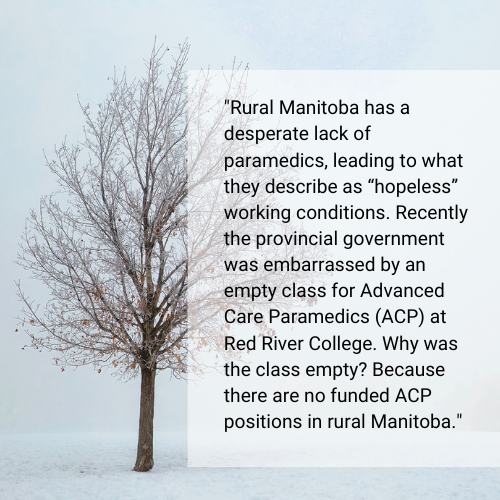
The following op-ed by MHC Provincial Director Thomas Linner was originally published in the Brandon Sun on Thursday, February 2, 2023.
On August 19, 2022 the provincial government announced plans to contract out inter-facility transfer of low acuity patients “from the Brandon, Selkirk and Winkler/Morden areas to medical appointments, diagnostic tests or for treatment.” The Manitoba Health Coalition (MHC) is concerned that, once again, the Pallister-Stefanson government has ignored the actual rural health care staffing crisis – the severe lack of rural health care professionals, including paramedics and emergency medical dispatchers – with a service provision crisis.
MHC is also concerned that this plan is based on a pilot project conducted in Southern Health earlier in 2022 for which no information has been provided to the public. Health Minister Audrey Gordon has stated on the record that the pilot “has been so successful, we’re now going to be rolling it out in other areas of the province.” Surely, if the pilot project actually improved patient care, the government would share the results of that trial with the people of Manitoba.
But most importantly, with a rural health care crisis that has seen multiple rural hospital closures due to staff shortages – including a dangerous lack of allied health care professionals – is this all the government has in response?
Certainly, the early reviews are not great. As Acting Fire Chief Terry Parlow explained to the
Brandon Sun, the new service in Brandon “has so far had no noticeable impact on emergency responders.”
Rural Manitoba has a desperate lack of paramedics, leading to what they describe as “hopeless” working conditions. Recently the provincial government was embarrassed by an empty class for Advanced Care Paramedics (ACP) at Red River College. Why was the class empty? Because there are no funded ACP positions in rural Manitoba.
Jason Linklater, President of the Manitoba Association of Health Care Professionals (MHCP) which represents rural paramedics, summed it up this way: “[F]unding an ACP program should be good news, but it’s not because there’s nowhere for those people to go once they finish school. There are no ACP jobs [in rural Manitoba]. That’s why it feels to me like a mirage, because it is.”
If the provincial government really wants to improve working conditions and increase the number of rural health care professionals, including paramedics, it should scrap its plans to cut and consolidate rural health care delivery as part of the Clinical and Preventive Services Plan, which in its previous phase provided cover for the closing of Winnipeg ERs, the privatization of outpatient services and cutting critical care capacity.
The government has announced a $200 million Health Human Resources strategy, which is a positive first step to acknowledging the problem. But the province has attached no timeline for this strategy, nor any targets for recruitment and retention for specific professions or in the different health regions. There is no indication of whether or not the $200 million is all new money, already committed funding or a combination thereof. The government has already been forced to pay out $217 million in retro pay to nurses alone due to its mismanagement of public sector contracts, while over 6500 allied health professionals still remain without a contract after nearly five years. It is therefore unclear that $200 million over an unspecified period will be anywhere near sufficient to solve the growing staffing crisis.
Brandon is an important hub for Manitoba health care. Cuts and closures in the Westman area inevitably put more pressure on facilities and service providers based in the Wheat City. There are serious staffing concerns in Brandon itself which need direct attention – and funding – to alleviate.
Once again, we are left with the impression that the Stefanson government’s approach is to cut services, create chaos for health care providers and communities, then sell privatization as a silver bullet. It seems like a whole lot of effort is being expended to expand private profit in health care in areas like patient transport, rather than addressing the core investments necessary to improve health care delivery.
Communities across Manitoba, big and small, deserve better.
Thomas Linner is the Provincial Director of the Manitoba Health Coalition, a non-profit, non-partisan organization dedicated to the protection and expansion of public health care in Manitoba.


